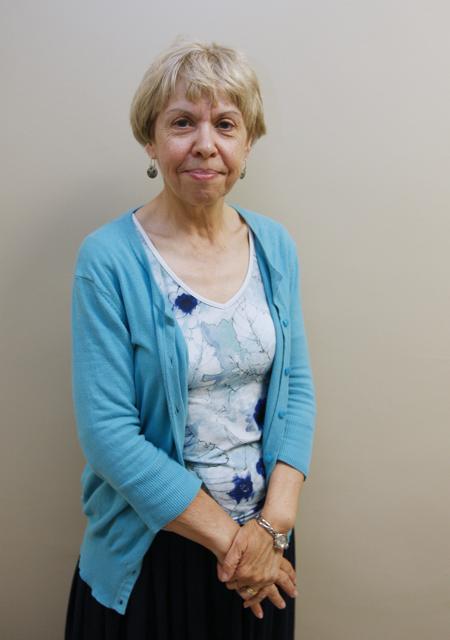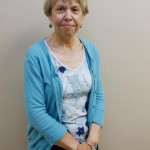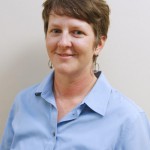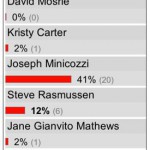- Jane Matthews
- Received votes from Cecil Bothwell, Brownie Newman, Gordon Smith, Terry Bellamy
- ****Production Note: Each Appointee will have a corresponding pic and council votes. The second blurb should correspond with the image of our graph displaying our online poll results.**** Photos by Jonathan Welch
- Kristy Carter
In the most competitive appointment process in the Planning and Zoning Commission’s recent history, nine candidates made their case for a seat on the influential board during Asheville City Council’s Aug. 23 meeting. Council substantially expanded the seven-member commission’s powers back in June, making it the final arbiter of projects involving more than 35,000 square feet or at least 20 residential units. P&Z also has considerable leeway in interpreting and advising Council on the city's overall development goals.
After picking applicants' brains for nearly three hours on everything from their backgrounds and possible conflicts of interest to their thoughts on affordable housing, Council members settled on Jane Mathews, Jeremy Goldstein and Kristy Carter. And the in-depth selection process shed some light on the perspectives each will bring to one of the city’s most powerful appointed bodies.
Jane Mathews
Mathews, who previously served on the commission in the 1990s and chaired it from 1997 to ’99, said she would "bring a long-term knowledge of where we've been and where we're heading. I feel like that's a really good voice to add to the commission." The local architect cited a lengthy résumé of public service, including the Riverfront Redevelopment Commission, the Mayor's Affordable Housing Task Force and other boards.
Mathews, who helped write the original draft of the city's United Develop Ordinance more than 10 years ago, said it’s important to view it as "a living document."
"When I was on the commission, we worked hard to make the document something that was understandable to the community," she explained. "But it needs to be made better. It's not very user-friendly. … It's a lot of legal text."
Mathews also stressed the importance of "pairing density with neighborhood compatibility." In a written statement submitted as part of her application, she explained: "My vision has been to find opportunities to encourage development and growth, particularly mixed-use, in areas that are best suited for the types of change that can serve and enhance established neighborhoods as well as create new neighborhoods."
Kristy Carter
Asked by Council member Cecil Bothwell how the UDO could be improved, Kristy Carter agreed with Mathews that the lengthy document, which she called “big and complicated,” could use some streamlining.
A community-development planner with the state Department of Commerce, Carter has served on Asheville’s Board of Adjustment since 2007. Council Member Esther Manheimer said Carter had gained a reputation on that board for "rigid" adherence to the rules. But Carter maintained that she's become more flexible over time.
"I know a lot more about the complications of planning now," she explained. "What I've figured out now is, 'What is the spirit and intent of the ordinance?' in addition to 'What does the ordinance say, and what are the standards?'"
In her written application, Carter cited the Planning and Zoning Commission's approval of the controversial Larchmont project off Merrimon Avenue as an example of a decision she agreed with, noting: "Planning board members are often called on to make recommendations that are tough and unpopular, yet the long-term vision for the community has to guide the decision-making process, and this project is an example of that."
Citing another recent controversial issue, Carter noted that though she didn't personally like the idea of an expanded Ingles Market along the Smokey Park Highway, she felt the commission did the right thing by voting to let it happen.
"It's a value of mine to reduce and reuse resources. When stores such as Ingles want to double their store size, I get twitchy when I think about the resources needed for expansion," Carter explained. "In this case, it was the project, not the decision, with which I disagree. … I have to separate my personal hot buttons from the project that is before me. I think that is the biggest challenge planning board members face. … It is my role to listen to the information presented, hear the facts objectively, and connect those to the overall vision for that part of the community."
Jeremy Goldstein
Council member Brownie Newman aimed to gauge how Jeremy Goldstein approaches decision-making, saying, "The character-and-scale process under the UDO is pretty subjective. Speak to us about how you would think about that. Are there any projects that have been built in recent years that don't seem to meet the criteria?"
A commercial real estate developer who’s co-owner of the G/M Property Group, Goldstein emphasized that he wants the city to grow and said he doesn’t see any projects he wouldn't have approved of.
"What may appear to be out of scale today — fast-forward 10 or 20 years, when things get built around it, and it may not," he observed. "When the Jackson Building was built, it may have been out of scale; people may not have liked it at the time. But what you see after the passage of time is that they may have lacked context to make an opinion on it."
In his application, Goldstein maintained that he has "no predetermined bias for the nature of our growth, other than to let the market dictate." He also wrote: "In the last five to six years, there has been a strong negative reaction to perceived vs. actual downtown growth. … The market ultimately dictates what is built. Additional layers of regulations and restrictions will simply discourage additional investment in our community."
Goldstein also noted in his application that he's "successfully completed nearly $500 million in sales, leasing and financing transactions and evaluated/underwritten well over $2 billion of commercial property."
Noting that his business interests could potentially pose conflicts of interest, Council member Gordon Smith quizzed Goldstein about how he "might handle personal relationships with developers, builders and other business partners" as a member of the board.
Goldstein dismissed those concerns, however, saying, "It would not be a problem," because he would recuse himself from votes on any projects in which he had a financial interest. He added that many of the business projects he's involved in are located in other parts of the country.
— Jake Frankel can be reached at 251-1333, ext. 115, or at jfrankel@mountainx.com.








Before you comment
The comments section is here to provide a platform for civil dialogue on the issues we face together as a local community. Xpress is committed to offering this platform for all voices, but when the tone of the discussion gets nasty or strays off topic, we believe many people choose not to participate. Xpress editors are determined to moderate comments to ensure a constructive interchange is maintained. All comments judged not to be in keeping with the spirit of civil discourse will be removed and repeat violators will be banned. See here for our terms of service. Thank you for being part of this effort to promote respectful discussion.